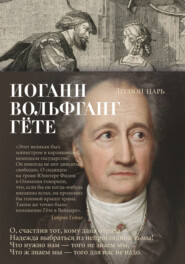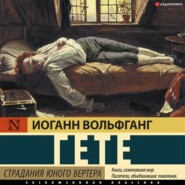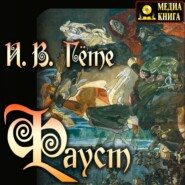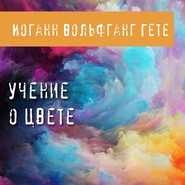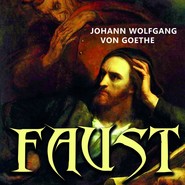По всем вопросам обращайтесь на: info@litportal.ru
(©) 2003-2024.
✖
Wilhelm Meister's Apprenticeship and Travels, Vol. I (of 2)
Настройки чтения
Размер шрифта
Высота строк
Поля
He had not leisure to pursue his thoughts: the curtain once more parted; and a person stood before him, whom he instantly perceived to be the country clergyman that had attended him and his companions on that pleasure-sail of theirs. He had a resemblance to the abbé, though he seemed to be a different person. With a cheerful countenance, in a tone of dignity, he said, "To guard from error is not the instructor's duty, but to lead the erring pupil; nay, to let him quaff his error in deep, satiating draughts, this is the instructor's wisdom. He who only tastes his error, will long dwell with it, will take delight in it as in a singular felicity; while he who drains it to the dregs will, if he be not crazy, find it out." The curtain closed again, and Wilhelm had a little time to think. "What error can he mean," said he within himself, "but the error which has clung to me through my whole life, – that I sought for cultivation where it was not to be found; that I fancied I could form a talent in me, while without the smallest gift for it?"
The curtain dashed asunder faster than before: an officer advanced, and said in passing, "Learn to know the men who may be trusted!" The curtain closed; and Wilhelm did not long consider, till he found this officer to be the one who had embraced him in the count's park, and had caused his taking Jarno for a crimp. How that stranger had come hither, who he was, were riddles to our friend. "If so many men," cried he, "took interest in thee, know thy way of life, and how it should be carried on, why did they not conduct thee with greater strictness, with greater seriousness? Why did they favor thy silly sports, instead of drawing thee away from them?"
"Dispute not with us!" cried a voice. "Thou art saved, thou art on the way to the goal. None of thy follies wilt thou repent; none wilt thou wish to repeat; no luckier destiny can be allotted to a man." The curtain went asunder, and in full armor stood the old king of Denmark in the space. "I am thy father's spirit," said the figure; "and I depart in comfort since my wishes for thee are accomplished, in a higher sense than I myself contemplated. Steep regions cannot be surmounted save by winding paths: on the plain, straight roads conduct from place to place. Farewell, and think of me when thou enjoyest what I have provided for thee."
Wilhelm was exceedingly amazed and struck: he thought it was his father's voice; and yet in truth it was not: the present and the past alike confounded and perplexed him.
He had not meditated long when the abbé came to view, and placed himself behind the green table. "Come hither!" cried he to his marvelling friend. He went, and mounted up the steps. On the green cloth lay a little roll. "Here is your indenture," said the abbé: "take it to heart; it is of weighty import." Wilhelm lifted, opened it, and read: —
INDENTURE
Art is long, life short, judgment difficult, opportunity transient. To act is easy, to think is hard; to act according to our thought is troublesome. Every beginning is cheerful: the threshold is the place of expectation. The boy stands astonished, his impressions guide him: he learns sportfully, seriousness comes on him by surprise. Imitation is born with us: what should be imitated is not easy to discover. The excellent is rarely found, more rarely valued. The height charms us, the steps to it do not: with the summit in our eye, we love to walk along the plain. It is but a part of art that can be taught: the artist needs it all. Who knows it half, speaks much, and is always wrong: who knows it wholly, inclines to act, and speaks seldom or late. The former have no secrets and no force: the instruction they can give is like baked bread, savory and satisfying for a single day; but flour cannot be sown, and seed-corn ought not to be ground. Words are good, but they are not the best. The best is not to be explained by words. The spirit in which we act is the highest matter. Action can be understood and again represented by the spirit alone. No one knows what he is doing while he acts aright, but of what is wrong we are always conscious. Whoever works with symbols only is a pedant, a hypocrite, or a bungler. There are many such, and they like to be together. Their babbling detains the scholar: their obstinate mediocrity vexes even the best. The instruction which the true artist gives us opens the mind; for, where words fail him, deeds speak. The true scholar learns from the known to unfold the unknown, and approaches more and more to being a master.
"Enough!" cried the abbé: "the rest in due time. Now look round you among these cases."
Wilhelm went, and read the titles of the rolls. With astonishment he found, "Lothario's Apprenticeship," "Jarno's Apprenticeship," and his own Apprenticeship placed there, with many others whose names he did not know.
"May I hope to cast a look into these rolls?"
"In this chamber there is now nothing hid from you."
"May I put a question?"
"Without scruple; and you may expect a positive reply, if it concerns a matter which is nearest your heart, and ought to be so."
"Good, then! Ye marvellous sages, whose sight has pierced so many secrets, can you tell me whether Felix is in truth my son?"
"Hail to you for this question!" cried the abbé, clapping hands for joy. "Felix is your son! By the holiest that lies hid among us, I swear to you Felix is your son; nor, in our opinion, was the mother that is gone unworthy of you. Receive the lovely child from our hands: turn round, and venture to be happy."
Wilhelm heard a noise behind him: he turned round, and saw a child's face peeping archly through the tapestry at the end of the room; it was Felix. The boy playfully hid himself so soon as he was noticed. "Come forward!" cried the abbé: he came running; his father rushed towards him, took him in his arms, and pressed him to his heart. "Yes! I feel it," cried he, "thou art mine! What a gift of Heaven have I to thank my friends for! Whence or how comest thou, my child, at this important moment?"
"Ask not," said the abbé. "Hail to thee, young man! Thy Apprenticeship is done: Nature has pronounced thee free."
notes
1
Der Schafer putzte sich zum Tanz, – a song of Goethe's. – Ed.
2
So in the original. – Ed.
The curtain dashed asunder faster than before: an officer advanced, and said in passing, "Learn to know the men who may be trusted!" The curtain closed; and Wilhelm did not long consider, till he found this officer to be the one who had embraced him in the count's park, and had caused his taking Jarno for a crimp. How that stranger had come hither, who he was, were riddles to our friend. "If so many men," cried he, "took interest in thee, know thy way of life, and how it should be carried on, why did they not conduct thee with greater strictness, with greater seriousness? Why did they favor thy silly sports, instead of drawing thee away from them?"
"Dispute not with us!" cried a voice. "Thou art saved, thou art on the way to the goal. None of thy follies wilt thou repent; none wilt thou wish to repeat; no luckier destiny can be allotted to a man." The curtain went asunder, and in full armor stood the old king of Denmark in the space. "I am thy father's spirit," said the figure; "and I depart in comfort since my wishes for thee are accomplished, in a higher sense than I myself contemplated. Steep regions cannot be surmounted save by winding paths: on the plain, straight roads conduct from place to place. Farewell, and think of me when thou enjoyest what I have provided for thee."
Wilhelm was exceedingly amazed and struck: he thought it was his father's voice; and yet in truth it was not: the present and the past alike confounded and perplexed him.
He had not meditated long when the abbé came to view, and placed himself behind the green table. "Come hither!" cried he to his marvelling friend. He went, and mounted up the steps. On the green cloth lay a little roll. "Here is your indenture," said the abbé: "take it to heart; it is of weighty import." Wilhelm lifted, opened it, and read: —
INDENTURE
Art is long, life short, judgment difficult, opportunity transient. To act is easy, to think is hard; to act according to our thought is troublesome. Every beginning is cheerful: the threshold is the place of expectation. The boy stands astonished, his impressions guide him: he learns sportfully, seriousness comes on him by surprise. Imitation is born with us: what should be imitated is not easy to discover. The excellent is rarely found, more rarely valued. The height charms us, the steps to it do not: with the summit in our eye, we love to walk along the plain. It is but a part of art that can be taught: the artist needs it all. Who knows it half, speaks much, and is always wrong: who knows it wholly, inclines to act, and speaks seldom or late. The former have no secrets and no force: the instruction they can give is like baked bread, savory and satisfying for a single day; but flour cannot be sown, and seed-corn ought not to be ground. Words are good, but they are not the best. The best is not to be explained by words. The spirit in which we act is the highest matter. Action can be understood and again represented by the spirit alone. No one knows what he is doing while he acts aright, but of what is wrong we are always conscious. Whoever works with symbols only is a pedant, a hypocrite, or a bungler. There are many such, and they like to be together. Their babbling detains the scholar: their obstinate mediocrity vexes even the best. The instruction which the true artist gives us opens the mind; for, where words fail him, deeds speak. The true scholar learns from the known to unfold the unknown, and approaches more and more to being a master.
"Enough!" cried the abbé: "the rest in due time. Now look round you among these cases."
Wilhelm went, and read the titles of the rolls. With astonishment he found, "Lothario's Apprenticeship," "Jarno's Apprenticeship," and his own Apprenticeship placed there, with many others whose names he did not know.
"May I hope to cast a look into these rolls?"
"In this chamber there is now nothing hid from you."
"May I put a question?"
"Without scruple; and you may expect a positive reply, if it concerns a matter which is nearest your heart, and ought to be so."
"Good, then! Ye marvellous sages, whose sight has pierced so many secrets, can you tell me whether Felix is in truth my son?"
"Hail to you for this question!" cried the abbé, clapping hands for joy. "Felix is your son! By the holiest that lies hid among us, I swear to you Felix is your son; nor, in our opinion, was the mother that is gone unworthy of you. Receive the lovely child from our hands: turn round, and venture to be happy."
Wilhelm heard a noise behind him: he turned round, and saw a child's face peeping archly through the tapestry at the end of the room; it was Felix. The boy playfully hid himself so soon as he was noticed. "Come forward!" cried the abbé: he came running; his father rushed towards him, took him in his arms, and pressed him to his heart. "Yes! I feel it," cried he, "thou art mine! What a gift of Heaven have I to thank my friends for! Whence or how comest thou, my child, at this important moment?"
"Ask not," said the abbé. "Hail to thee, young man! Thy Apprenticeship is done: Nature has pronounced thee free."
notes
1
Der Schafer putzte sich zum Tanz, – a song of Goethe's. – Ed.
2
So in the original. – Ed.











